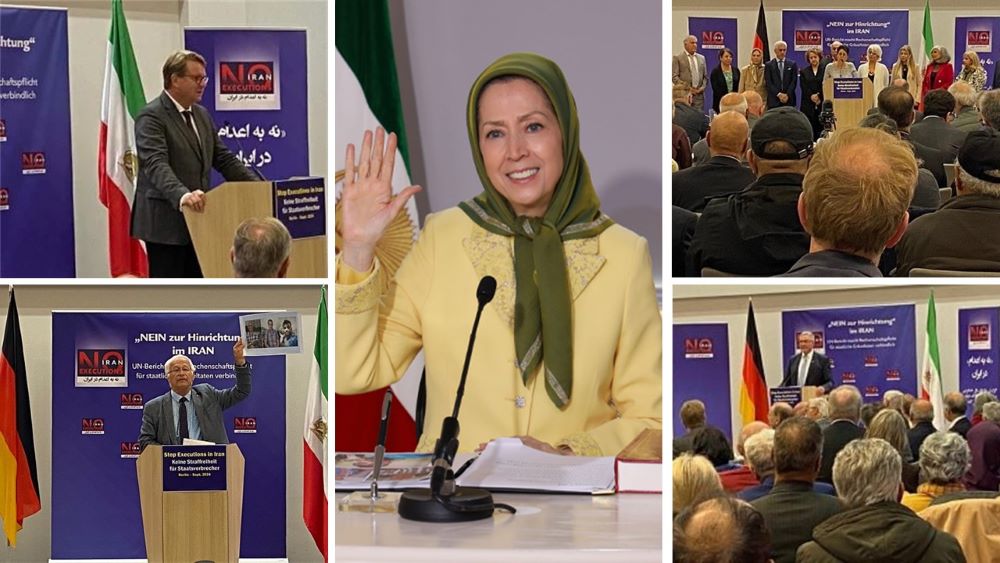
A significant conference on human rights violations in Iran was recently held in Berlin, organized by the German Section of the Exiled Iranian Communities in Europe and the German Solidarity Committee for a Free Iran (DSFI). The event brought together politicians, legal experts, and human rights advocates to address the increasing human rights abuses and mass executions in Iran.
Key Concerns and Findings
The conference highlighted urgent concerns over the rise in executions under Iran’s new president, Masoud Pezeshkian. Reports indicated at least 191 prisoners, including women and political prisoners, were executed since his inauguration. Amnesty International data showed that 74% of all recorded executions globally in 2023 were in Iran.
Notable Speakers and Their Statements
Mrs. Maryam Rajavi, President-elect of the NCRI
Mrs. Maryam Rajavi, speaking via video from Paris, criticized the long-standing policy of appeasement toward the Iranian regime by Western nations. She highlighted two major misconceptions that have enabled the regime to maintain power.
Conference with MPs and distinguished dignitaries in Germany
The people of #Iran are calling for freedom and democracy, a republic based on the separation of religion and state, gender equality, autonomy for nationalities, and an Iran without executions and torture. Without… pic.twitter.com/oJG4JTUHmm— Maryam Rajavi (@Maryam_Rajavi) September 28, 2024
“For years, the Iranian regime has manipulated the West with two lies: first, that the regime will eventually moderate, and second, that there is no viable alternative to the regime,” Mrs. Rajavi stated. “Today, many European nations, including Germany, are starting to realize that this regime will not change. Verbal condemnations of the regime, while ignoring the organized resistance, achieve nothing.”
Mrs. Rajavi also emphasized that “to stop executions and repression, the Mullahs’ regime must be removed, and the Iranian people must be supported in their fight for freedom.”
Carsten Müller, Member of the German Bundestag
Müller condemned the ongoing executions in Iran, stating, “We are witnessing horrific human rights violations, with executions becoming routine in Iran. The regime is not only persecuting its own people but also infiltrating Western countries by installing so-called ‘Iran experts’ in influential positions”.
Herta Däubler-Gmelin, Former German Minister of Justice
Däubler-Gmelin emphasized the importance of Javid Rehman’s report on Iran, stating, “The report by Professor Javid Rehman is horrifying and crucial. It documents massacres, murders, and rapes. These crimes cannot go unpunished”.
Franz Josef Jung, Former German Minister of Defense
Jung highlighted the regime’s use of executions to maintain control, saying, “The executions, especially of political dissidents, are a tool for the regime to maintain fear and control”.
Ambassador Joachim Rücker
Rücker called for classifying the IRGC as a terrorist organization, stating, “We need to recognize the IRGC for what it is—a terrorist organization. It is not just responsible for terror within Iran, but its influence extends far beyond”.
Witnesses and Survivors Testimonies
Akbar Bandali, a survivor of the 1988 massacre, recounted, “In my first night in prison, I witnessed the execution of 140 people. These mass executions happened twice a week”.
Vida Niktalean, a relative of massacre victims, shared, “They told us my cousin Hamid was executed shortly after his wrongful arrest. They even demanded we pay for the bullets used in his execution”.
Ingrid Betancourt, Former Colombian Senator
Ms. Betancourt highlighted how disinformation campaigns are used against opposition groups like PMOI/MEK: “I realized this was a manipulation tactic by the Iranian regime.”
Günter Nooke, Former Human Rights Commissioner of Germany
Nooke criticized Western complicity due to economic interests: “The massacre of political prisoners in Iran is a glaring example of impunity.”
Martin Patzelt, Former Member of the German Bundestag
Patzelt addressed the Iranian regime’s campaign to discredit the MEK and broader Iranian resistance.
Professor Wolfgang Schomburg, Former Judge at the International Criminal Court
Schomburg stressed the importance of establishing an international tribunal to hold the Iranian regime accountable.
Nina Pesian, Representative of the German-Iranian Society
Pesian spoke about the continued suffering of Iranian people and called for more international support.
The conference also featured testimonies from survivors and witnesses of the 1988 massacre. It concluded with a unified call for immediate action from the international community, including designating the IRGC as a terrorist organization, enforcing international sanctions, and recognizing the 1988 massacre as genocide.